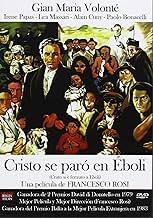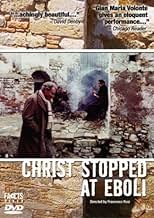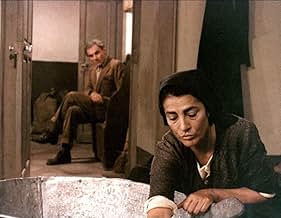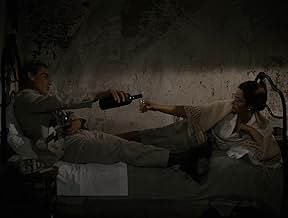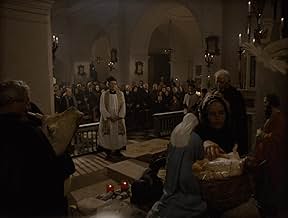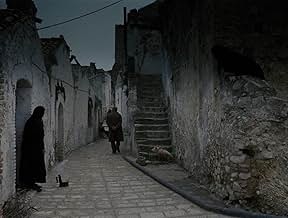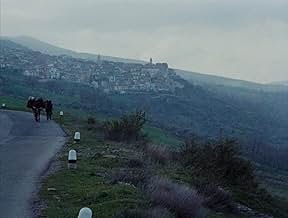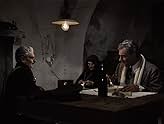IMDb RATING
7.7/10
4.8K
YOUR RATING
A doctor in Fascist Italy is exiled to a remote village for his political views.A doctor in Fascist Italy is exiled to a remote village for his political views.A doctor in Fascist Italy is exiled to a remote village for his political views.
- Won 1 BAFTA Award
- 7 wins & 1 nomination total
Enzo Vitale
- Dottore Milillo
- (as Vincenzo Vitale)
7.74.7K
1
2
3
4
5
6
7
8
9
10
Featured reviews
A slow movie, in the good sense of the word
"Christ stopped at Eboli" (or in Italian "Cristo si e fermato a Eboli") is a rather hard to find movie. The theatrical release is about 2,5 hours long, but I saw the TV movie, that is nearly an hour longer.
The movie is about the banishment of narrator Carlo Levi in 1935 - 1936. Levi was a left wing intellectual and critic of Italian dictator Benito Mussolini.
The story is situated during the war between Italy and Abyssinia (todays Ethiopia), so before the Second World War.
In spite of the title, the movie is neither about Christ nor about Eboli.
Not about Eboli because the train station of Eboli is only a stopover in the journey of Levi to his banishment location of Grassano and Luciano, two small villages in the Southern region of Lucania (today Basilicata).
Not about Christ because in the remote villages of Grassano and Lucania the Roman Catholic faith is only a surface below which ancient pagan beliefs still lives on.
In his banishment location Levi enjoys a great deal of freedom. Mussolini is more concerned with getting rid of him in the political discourse than to punish him. At the beginning Levi is first of all an observing outsider but gradually he integrates with the local community, in no small measure thanks to his medical knowledge.
"Christ stopped at Eboli" is a film about the wealth difference between North- and South Italy. Levi encounters instances of malaria in his banishment location. Many citizens try to flee the poverty by emigrating to the United States. The "emotional distance" to New York seems almost shorter than to Rome.
But "Christ stopped at Eboli" is in particular a film about the mixture of Christianity and pagan beliefs. In many instances we see this combination in horror like movies (compare "The wicker man", 1973, Robin Hardy) but in "Christ stopped at Eboli" it is used to full effect in a social drama.
The film is above all a slow movie, in the good sense of the word. The central theme is the gradual integration of he main character in the local community, "gradual" being the essential word in this sentence.
Francesco Rosi is not a very well known director. He is of the same generation as the more popular Taviani brothers. "Christ stopped at Eboli" has also some resemblance with some Taviani movies, situated as it is in the poor South. I am thinking of "Padre Padrone" (1977) in particular. Compared with "Christ stopped at Eboli" "Padre Padrone" is however nearly an action movie.
The movie is about the banishment of narrator Carlo Levi in 1935 - 1936. Levi was a left wing intellectual and critic of Italian dictator Benito Mussolini.
The story is situated during the war between Italy and Abyssinia (todays Ethiopia), so before the Second World War.
In spite of the title, the movie is neither about Christ nor about Eboli.
Not about Eboli because the train station of Eboli is only a stopover in the journey of Levi to his banishment location of Grassano and Luciano, two small villages in the Southern region of Lucania (today Basilicata).
Not about Christ because in the remote villages of Grassano and Lucania the Roman Catholic faith is only a surface below which ancient pagan beliefs still lives on.
In his banishment location Levi enjoys a great deal of freedom. Mussolini is more concerned with getting rid of him in the political discourse than to punish him. At the beginning Levi is first of all an observing outsider but gradually he integrates with the local community, in no small measure thanks to his medical knowledge.
"Christ stopped at Eboli" is a film about the wealth difference between North- and South Italy. Levi encounters instances of malaria in his banishment location. Many citizens try to flee the poverty by emigrating to the United States. The "emotional distance" to New York seems almost shorter than to Rome.
But "Christ stopped at Eboli" is in particular a film about the mixture of Christianity and pagan beliefs. In many instances we see this combination in horror like movies (compare "The wicker man", 1973, Robin Hardy) but in "Christ stopped at Eboli" it is used to full effect in a social drama.
The film is above all a slow movie, in the good sense of the word. The central theme is the gradual integration of he main character in the local community, "gradual" being the essential word in this sentence.
Francesco Rosi is not a very well known director. He is of the same generation as the more popular Taviani brothers. "Christ stopped at Eboli" has also some resemblance with some Taviani movies, situated as it is in the poor South. I am thinking of "Padre Padrone" (1977) in particular. Compared with "Christ stopped at Eboli" "Padre Padrone" is however nearly an action movie.
Reasonably faithful to the book
I have seen this TV film several times after reading Carlo Levi's book and having been to the Basilicata area in which Levi was exiled.
I consider the film to represent the book's aims which is to show the oppressed state of the peasants in Basilicata, the remoteness and lack of care of central government in Rome and the way in which the fascists could control the local area with very limited support - but of the people who mattered, the mayor, doctor, police. The rest of the populace could be, and were ignored.
A brief nitpicking comment on the title. It comes from something the priest said - on the lines that Christ never reached Aliano but stopped at Eboli some 150 miles distant. Eboli plays no part in Levi's book and the start of the film is wrong in showing him changing trains there, and picking up the stray dog. To get to Matera, where he started his exile he changed in Bari and would not have gone anywhere near Eboli.
I consider the film to represent the book's aims which is to show the oppressed state of the peasants in Basilicata, the remoteness and lack of care of central government in Rome and the way in which the fascists could control the local area with very limited support - but of the people who mattered, the mayor, doctor, police. The rest of the populace could be, and were ignored.
A brief nitpicking comment on the title. It comes from something the priest said - on the lines that Christ never reached Aliano but stopped at Eboli some 150 miles distant. Eboli plays no part in Levi's book and the start of the film is wrong in showing him changing trains there, and picking up the stray dog. To get to Matera, where he started his exile he changed in Bari and would not have gone anywhere near Eboli.
Christ stopped in eboli
this movie did more than any other Italian film i've seen to interest me in italy itself--the people, the land, the culture. it also opened my mind to the intelligence of the uneducated among us--i loved that guilia was so real and right-n and so full of peasant superstition that in no way interfered with her ability to "get it." i have begun to travel in italy and having seen this film i am driven to see the south and visit the carlo levi house and museum. his paintings see into the object, to me, like a quality black and white study which i find the most expressive medium. as soon as i see the faces in the beginning of this film, i am drawn in. i found the melancholy music somewhat sentimental (like the music in truffaut's films) but a necessary comfort.
Transports you to a time and place
"If these people in Rome have so much money to spend on war, why don't they spend it here?"
For his antifascist views, the writer and painter Carlo Levi was exiled by Mussolini in 1935 to the gorgeous but rugged and isolated stone town of Aliano in Basilicata, 90km away from Matera. At this time it was an area known for being unchanged over centuries and rather backward by people in the north, and Levi describes it as not even having been visited by Christ, who he says went no further than the train station in Eboli. In one sense religion plays a role here, with one devout landowner saying he's seen a saint at a religious site and a gravedigger saying he saw the devil on a stormy night, but in another sense, they seem to believe more in folklore, ignore the local priest, and only attend mass at holiday time.
From the beginning Levi (played by Gian Maria Volonté) encounters conservative customs and ignorant superstitions, e.g. Daughters who have to spend a year in seclusion if a brother dies (three if it's the father), a doctor who believes the women in town put menstrual blood in "love potions," and the woman whose house he's staying in believing her husband died because a peasant witch put an "evil eye" on him before giving him a deadly magic potion. Eventually Levi takes his own place and hires a maid (Irene Papas) who expresses the peasants' belief that a rainbow causes a certain disease, trash can't be thrown out at night lest it hit the angel that guards the house until daybreak, and that the spirits of the unbaptized can reveal locations of treasure to people in dreams.
Despite being in the middle of nowhere, Levi came to appreciate the hard lives the poor peasants led and saw the injustice of them being ruled from afar by the government to the north, practically a separate Italy, leaving them not represented well at all. They were largely forgotten by the rest of the country until it came time to extract something out of them, e.g. Money for taxes, or young men for war. An example of a new law is higher taxes on goats because they're believed to be bad for farming in the north, but this is terrible for the peasants in this south who depend on them and now feel they have to kill them (beware, there is a butchering scene during this segment, as well as a graphic pig castration scene later). Meanwhile, a cranky tax collector is bitter over how the locals treat him, but who can blame them when he describes his job as taking whatever they have to collect what they owe - a goat, rabbit, wheel of cheese, or bottle of olive oil.
As a warning, this is not a plot-heavy story, and Levi soon settles into the sleepy rhythms of the town, among other things wandering about and watching the kids up to various mischief, like harassing a goat by hitting it with a stick while riding it, or throwing rocks at the local priest. One day Levi lies in a freshly dug grave to beat the heat, and in general he spends time painting and reading the books he can get his hands on. His copy of a book by Montaigne is confiscated by the town mayor as it's in French and deemed "dangerous." The mayor gives a speech to the townsfolk where attendance is mandatory and he extols the virtues of Mussolini invading Abyssinia. He says "The Roman legions once ruled the world. Rome's renewed greatest shines on its seven hills!" to which Levi says privately to himself, "...Shines on the seven hills. But here the hills crumble and turn to dust."
There are some in the town who have escaped their hard life by going to America, but as they're separated from family many of them return. One has a photo of FDR on his wall and is listening to aviator Francesco de Pinedo on a phonograph when Levi meets him (Pinedo was a pioneering Italian aviator who had died in a crash just a couple of years earlier). In another scene there is a rousing folk song performed, one reminding me of Portuguese fado, expressing the bittersweet feelings of being separated from loved ones by going to America.
Levi toes the line in not agitating with his political views, but quietly chafes when the mayor reads all his mail and finds certain correspondences objectionable. The mayor wants to believe he's an educated man like Levi and to talk to him like a fellow intellectual, and their discussions were among the most interesting scenes in the film for me. It's notable that the mayor excuses himself from enlisting in the invasion against Abyssinia because of his "health issues," for isn't this usually the way with these kinds of guys? And meanwhile, Levi expresses a deeper truth, that the peasants have a fundamental distrust of all flags and wars based on history, and moreover, that they view the government as something to be endured, like an event out of nature, completely separate from them. He says:
"The State is 'the people in Rome' who have always existed and always will, like hail, landslides, drought, and malaria. For the peasants, the State is farther away than the sky, and more evil because it's always their adversary. The State is a form of fate like the wind that burns the crops, and the fever that burns the blood."
It's in these moments we get the best feeling for the dynamic between north and south, and some of the south's history, like local feelings for the brigands who surfaced after unification 75 years earlier.
The final episode was rather slow as not much new was revealed, and not much had ever developed with Papas's character. It's probably true to life that way, with Levi expressing his goodbyes to the peasants who had appreciated his doctoring, and ultimately never returning. He has a conversation with his intellectual friends in the north, however, and surprises them by saying that to the south, it wouldn't matter what type of government ruled in Rome - fascist, progressive, or communist - as long as it didn't involve the peasants directly. Even though the book was published nearly 80 years ago, this adaptation is fascinating for its window into an era, as well as a springboard into further reading on Italy's "Southern Question."
For his antifascist views, the writer and painter Carlo Levi was exiled by Mussolini in 1935 to the gorgeous but rugged and isolated stone town of Aliano in Basilicata, 90km away from Matera. At this time it was an area known for being unchanged over centuries and rather backward by people in the north, and Levi describes it as not even having been visited by Christ, who he says went no further than the train station in Eboli. In one sense religion plays a role here, with one devout landowner saying he's seen a saint at a religious site and a gravedigger saying he saw the devil on a stormy night, but in another sense, they seem to believe more in folklore, ignore the local priest, and only attend mass at holiday time.
From the beginning Levi (played by Gian Maria Volonté) encounters conservative customs and ignorant superstitions, e.g. Daughters who have to spend a year in seclusion if a brother dies (three if it's the father), a doctor who believes the women in town put menstrual blood in "love potions," and the woman whose house he's staying in believing her husband died because a peasant witch put an "evil eye" on him before giving him a deadly magic potion. Eventually Levi takes his own place and hires a maid (Irene Papas) who expresses the peasants' belief that a rainbow causes a certain disease, trash can't be thrown out at night lest it hit the angel that guards the house until daybreak, and that the spirits of the unbaptized can reveal locations of treasure to people in dreams.
Despite being in the middle of nowhere, Levi came to appreciate the hard lives the poor peasants led and saw the injustice of them being ruled from afar by the government to the north, practically a separate Italy, leaving them not represented well at all. They were largely forgotten by the rest of the country until it came time to extract something out of them, e.g. Money for taxes, or young men for war. An example of a new law is higher taxes on goats because they're believed to be bad for farming in the north, but this is terrible for the peasants in this south who depend on them and now feel they have to kill them (beware, there is a butchering scene during this segment, as well as a graphic pig castration scene later). Meanwhile, a cranky tax collector is bitter over how the locals treat him, but who can blame them when he describes his job as taking whatever they have to collect what they owe - a goat, rabbit, wheel of cheese, or bottle of olive oil.
As a warning, this is not a plot-heavy story, and Levi soon settles into the sleepy rhythms of the town, among other things wandering about and watching the kids up to various mischief, like harassing a goat by hitting it with a stick while riding it, or throwing rocks at the local priest. One day Levi lies in a freshly dug grave to beat the heat, and in general he spends time painting and reading the books he can get his hands on. His copy of a book by Montaigne is confiscated by the town mayor as it's in French and deemed "dangerous." The mayor gives a speech to the townsfolk where attendance is mandatory and he extols the virtues of Mussolini invading Abyssinia. He says "The Roman legions once ruled the world. Rome's renewed greatest shines on its seven hills!" to which Levi says privately to himself, "...Shines on the seven hills. But here the hills crumble and turn to dust."
There are some in the town who have escaped their hard life by going to America, but as they're separated from family many of them return. One has a photo of FDR on his wall and is listening to aviator Francesco de Pinedo on a phonograph when Levi meets him (Pinedo was a pioneering Italian aviator who had died in a crash just a couple of years earlier). In another scene there is a rousing folk song performed, one reminding me of Portuguese fado, expressing the bittersweet feelings of being separated from loved ones by going to America.
Levi toes the line in not agitating with his political views, but quietly chafes when the mayor reads all his mail and finds certain correspondences objectionable. The mayor wants to believe he's an educated man like Levi and to talk to him like a fellow intellectual, and their discussions were among the most interesting scenes in the film for me. It's notable that the mayor excuses himself from enlisting in the invasion against Abyssinia because of his "health issues," for isn't this usually the way with these kinds of guys? And meanwhile, Levi expresses a deeper truth, that the peasants have a fundamental distrust of all flags and wars based on history, and moreover, that they view the government as something to be endured, like an event out of nature, completely separate from them. He says:
"The State is 'the people in Rome' who have always existed and always will, like hail, landslides, drought, and malaria. For the peasants, the State is farther away than the sky, and more evil because it's always their adversary. The State is a form of fate like the wind that burns the crops, and the fever that burns the blood."
It's in these moments we get the best feeling for the dynamic between north and south, and some of the south's history, like local feelings for the brigands who surfaced after unification 75 years earlier.
The final episode was rather slow as not much new was revealed, and not much had ever developed with Papas's character. It's probably true to life that way, with Levi expressing his goodbyes to the peasants who had appreciated his doctoring, and ultimately never returning. He has a conversation with his intellectual friends in the north, however, and surprises them by saying that to the south, it wouldn't matter what type of government ruled in Rome - fascist, progressive, or communist - as long as it didn't involve the peasants directly. Even though the book was published nearly 80 years ago, this adaptation is fascinating for its window into an era, as well as a springboard into further reading on Italy's "Southern Question."
Very good, if more intellectually stimulating than emotionally - Volante brilliant as always
Christ Stopped at Eboli is a captivating film experience (or do we call it a series given its in 4 parts on ah let's not split Southern Italian hairs, shall we now), mostly for how it raises so many ideas and has the time to explore them, though it is so episodic and gradually moving in many ways that it's sort of disappointing that one doesn't connect so much on any kind of emotional level to the men and women and occasional children that Carlo Levi meets and grows closer to and helps as a doctor (and sometimes cannot) over his year in exile as an anti-fascist in 1935 Italy.
There is one conversation that Carlo and the Mayor of this village near Eboli (hence the title), though this mayor speaking tries to do so not as the Mayor vut as a friend, and which stems from a letter Carlo was intending to send out from town to a female friend up North. The letter is telling about how he sees the peasants and townsfolk as not really being this or that but are there own people, and the Mayor Luigi gently but firmly says this isn't so and that the peasants just want more land (and tries to argue that conquering other lands like Italy tried to do in Africa) will accomplish that, and there are other ideas bounced back and forth between the men.
It's possibly one of the times in the film where there's a sense of conflict, and that it is all over the ideas presented - about who the peasants claim to be or who they are and how Fascist ideology spreads and is easy to detect but difficult to eradicate (you can see it right here in America right now, this is where I'd usually say I digress but no, this is a key point), and that one has to really rethink what 'The State' may be as an entity, and if it has to be rethought and changed entirely, to address so many issues that come about with like Nationalism and Pride and that feeling some who have almost nothing that if they, say, go off and fight in a war and come back as a hero it's worth it even at the risk of death, or that othering others and closing ranks with their own is so natural as breathing air, that's what may need to be done.
I may also be including in these observations what Carlo himself comes to understand by the time he's home years later and is talking with other intellectuals who think it's more cut and dry. I really was engaged with these scenes and any time really that Rosi and his writers were having people talk about such things- whether they were these exact conversations in reality or Levi was simplifying things for his book and by proxy the film, I'm pretty sure is the case but can't say for sure- and they are when I leaned forward most to pay attention to the film. I only wish much of the rest of the story/stories, at least for me, engaged me a little more emotionally speaking.
This isn't to say there aren't a couple of characters who have an impact, or at least impress upon Carlo just what life is like in the village: the mother who Carlo stays with (and says she's had 17 pregnancies, and she is really mother and father to all of her children since no one has stayed or have gone to America) and the one Priest who can't seem to reach anyone in the village (they decisively call him a drunk, though is it because they're such crappy people he drinks, one wonders) who Carlo also connects with somewhat, are two such examples. Other times there are some charming and interesting scenes where characters speak on their superstitions and other such issues, and there are some gorgeous shots of the landscapes and scenery (one should say it's due to the skill with finding the right light and tones for DP De Santis that it is so, not just what it is) and the musical score by Piccioni is lovely.
While Carlo does become certainly by episode 4 so emeshed in the community (it helps he has a pretty good track record as a non-practicing but well-learned doctor in a place where the only other medical help sucks, leave to being the Luke Wilson in Idiocracy effect one supposes, now I do digress), it doesn't mean we get a sense that Carlo has grown close particularly with any one person really. This has a pretty terrific reputation, so I looked at some of the less charitable reviews of the film and, putting aside the "it's boring" takes which don't help much, it did ring perhaps more true than not for me that the film does stand at a place (and I don't know if this is the case with the book since that's another medium altogether) where it is at an intellectual high ground, in other words the sort of peasants this is about... would they sit and watch a film like Christ Stopped at Eboli, or is it for us cineastes and art-house film buffs to sit and chew over?
I think Christ Stopped at Eboli benefits most of all if nothing else from being (I hate this coopted dumb phrase but I'll use it anyway) fair and balanced look at how someone who has his own ideas about society and fascism and anti-fasicsm is ironically put into instead of a prison and exile situation where he has to see how "they" live. I think after years of like the NY Times style pieces of "What do the people in diners *really* think" when it comes to looking at "them" and political leaders which are often not genuine, it is good to see a work of art that does try to look at people like this simply and plainly and, through a POV actor as gifted and compelling like Volante when largely listening and observing.
I just wish I felt more shaken on a more profound level by the sense of something more... poetic, perhaps (as a useful comparison, Tree with Wooden Clogs, which I thought this might more resemble, comes to mind). It is beautiful and well made, and yet it is like going to and having a really gigantic mutli-course meal at a restaurant, you'll remember to leave a nice tip and a good rating online, but will one come back to it? Hmm. 7.5/10.
There is one conversation that Carlo and the Mayor of this village near Eboli (hence the title), though this mayor speaking tries to do so not as the Mayor vut as a friend, and which stems from a letter Carlo was intending to send out from town to a female friend up North. The letter is telling about how he sees the peasants and townsfolk as not really being this or that but are there own people, and the Mayor Luigi gently but firmly says this isn't so and that the peasants just want more land (and tries to argue that conquering other lands like Italy tried to do in Africa) will accomplish that, and there are other ideas bounced back and forth between the men.
It's possibly one of the times in the film where there's a sense of conflict, and that it is all over the ideas presented - about who the peasants claim to be or who they are and how Fascist ideology spreads and is easy to detect but difficult to eradicate (you can see it right here in America right now, this is where I'd usually say I digress but no, this is a key point), and that one has to really rethink what 'The State' may be as an entity, and if it has to be rethought and changed entirely, to address so many issues that come about with like Nationalism and Pride and that feeling some who have almost nothing that if they, say, go off and fight in a war and come back as a hero it's worth it even at the risk of death, or that othering others and closing ranks with their own is so natural as breathing air, that's what may need to be done.
I may also be including in these observations what Carlo himself comes to understand by the time he's home years later and is talking with other intellectuals who think it's more cut and dry. I really was engaged with these scenes and any time really that Rosi and his writers were having people talk about such things- whether they were these exact conversations in reality or Levi was simplifying things for his book and by proxy the film, I'm pretty sure is the case but can't say for sure- and they are when I leaned forward most to pay attention to the film. I only wish much of the rest of the story/stories, at least for me, engaged me a little more emotionally speaking.
This isn't to say there aren't a couple of characters who have an impact, or at least impress upon Carlo just what life is like in the village: the mother who Carlo stays with (and says she's had 17 pregnancies, and she is really mother and father to all of her children since no one has stayed or have gone to America) and the one Priest who can't seem to reach anyone in the village (they decisively call him a drunk, though is it because they're such crappy people he drinks, one wonders) who Carlo also connects with somewhat, are two such examples. Other times there are some charming and interesting scenes where characters speak on their superstitions and other such issues, and there are some gorgeous shots of the landscapes and scenery (one should say it's due to the skill with finding the right light and tones for DP De Santis that it is so, not just what it is) and the musical score by Piccioni is lovely.
While Carlo does become certainly by episode 4 so emeshed in the community (it helps he has a pretty good track record as a non-practicing but well-learned doctor in a place where the only other medical help sucks, leave to being the Luke Wilson in Idiocracy effect one supposes, now I do digress), it doesn't mean we get a sense that Carlo has grown close particularly with any one person really. This has a pretty terrific reputation, so I looked at some of the less charitable reviews of the film and, putting aside the "it's boring" takes which don't help much, it did ring perhaps more true than not for me that the film does stand at a place (and I don't know if this is the case with the book since that's another medium altogether) where it is at an intellectual high ground, in other words the sort of peasants this is about... would they sit and watch a film like Christ Stopped at Eboli, or is it for us cineastes and art-house film buffs to sit and chew over?
I think Christ Stopped at Eboli benefits most of all if nothing else from being (I hate this coopted dumb phrase but I'll use it anyway) fair and balanced look at how someone who has his own ideas about society and fascism and anti-fasicsm is ironically put into instead of a prison and exile situation where he has to see how "they" live. I think after years of like the NY Times style pieces of "What do the people in diners *really* think" when it comes to looking at "them" and political leaders which are often not genuine, it is good to see a work of art that does try to look at people like this simply and plainly and, through a POV actor as gifted and compelling like Volante when largely listening and observing.
I just wish I felt more shaken on a more profound level by the sense of something more... poetic, perhaps (as a useful comparison, Tree with Wooden Clogs, which I thought this might more resemble, comes to mind). It is beautiful and well made, and yet it is like going to and having a really gigantic mutli-course meal at a restaurant, you'll remember to leave a nice tip and a good rating online, but will one come back to it? Hmm. 7.5/10.
Did you know
- TriviaThe title of the film and its source novel comes from an expression by the people of Gagliano who say of themselves, "Christ stopped short of here, at Eboli" which means, in effect, that they feel they have been bypassed by Christianity, by morality, by history itself-that they have somehow been excluded from the full human experience.
- GoofsOn the bus, the way Carlo holds the dog changes.
- Quotes
Luisa Levi: You'd need a woman here.
Carlo Levi: Yes, I would. But it's not easy.
Luisa Levi: Come on, don't exaggerate. Don't tell me that here even finding a cleaning lady is impossible.
Carlo Levi: Here a woman wouldn't go in the house of a single man. Just spending time together implies sleeping together.
Luisa Levi: You can't be serious.
Carlo Levi: Oh, yes I am.
- Alternate versionsThere are many versions ranging from 120 minutes to 222 minutes. The longest version available in the U.S. is 222 minutes and is available from the Criterion Collection on Blu-ray.
- ConnectionsFeatured in Il cineasta e il labirinto (2004)
- SoundtracksMaara Ca pi Ttia
Sung by Muzzi Loffredo
- How long is Christ Stopped at Eboli?Powered by Alexa
Details
- Release date
- Countries of origin
- Official site
- Language
- Also known as
- Christus kam nur bis Eboli
- Filming locations
- Aliano, Matera, Basilicata, Italy(second house where Levi lives)
- Production companies
- See more company credits at IMDbPro
Box office
- Gross US & Canada
- $78,736
- Opening weekend US & Canada
- $9,006
- Apr 7, 2019
- Gross worldwide
- $78,736
Contribute to this page
Suggest an edit or add missing content



